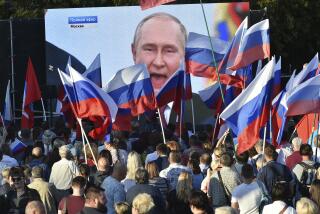Domestic Reform Must Progress or Soviet Foreign Policy Will Regain a Sinister Hue
- Share via
HAMBURG, West Germany — What has happened in Moscow in the past few days makes me think back to a visit to that city a few weeks ago. In mid-August, during the lull between the hectic events before the summer break and the return of the political leadership from vacation, I was struck by a very different mood than the one I had encountered on previous Moscow visits. The excitement of the new beginning had gone. Now there was, among those close to power and responsibility, a sense of urgency, even desperation, of getting results quickly, in the economy as well as in arms control. And there was, among the ordinary Russians I came across, a sense of uneasiness and concern: that the political leadership was too divided or too opportunistic, that their approach to reform was altogether too timid or too populist.
The events of the past weekend suggest that a Western reporter wasn’t alone in having these impressions. Mikhail S. Gorbachev himself must have felt them as he took the mood of the country on return from his holiday. He concluded that personnel changes in the top leadership, which he’d had in mind for some time, must be implemented without any further ado to keep his own credibility and that of the reforms alive. Now he has, for the time being at least, reestablished that credibility.
But, as in Robert Louis Stevenson’s “The Bottle Imp,” Gorbachev has paid a heavy price. In that novella, whoever owns the bottle is promised unlimited wealth, but his soul will be committed to the devil unless he can sell the bottle--and the pact with the devil--for less than he paid. Gorbachev, by putting his own team firmly in charge, has at the same time reduced the number of scapegoats and escape routes should the new approach falter. Given the choice between deadlock now and possible deadlock later, Gorbachev has taken the risk of the latter.
The most important implications of this dramatic response to inertia and inaction will, of course, be felt within the Soviet Union. After all, the basic motivation of the reformers is not a more ambitious Soviet policy abroad but the rebuilding of Soviet economy and society. What distinguishes the present team from its predecessors is the clear priority it gives to the task of putting the Soviet house in order.
Yet for the Soviet Union, as for any major power, policy cannot be purely domestic. What are the likely consequences of the recent changes on Soviet relations with the outside world? The answer is: both less and more than current Western wisdom suggests.
The consequences for Soviet foreign policy will be less, because the task of introducing reforms into a petrified political system requires all the attention and energy that any political leadership is capable of mustering. Even after Gorbachev’s reshuffle of personalities and procedures, the day-to-day slog remains, the need to overcome deeply ingrained habits, the task of giving people a stake in change when their experience suggests that change may be dangerous.
There will be crises within the Soviet Union, witness events in Kazakhstan and the Baltic states. And there will be potential conflict in the wider empire from Prague to Pyongyang, from East Berlin to Kabul. For this reason, the foreign-policy implications of events in Moscow will be less than many in the West think and some fear.
And yet the fate of Moscow reformers and their reforms will have a profound impact on foreign affairs after all. These reforms determine the image of the Soviet Union abroad and hence its international credibility. Imagine for a moment that Gorbachev’s many arms-control appeals to the West had not been accompanied by a visible departure from Brezhnevite practices at home. They would largely have been dismissed as diplomatic window dressing.
What assures these initiatives of international resonance is the fact that the Soviet Union so clearly wants a cooperative international climate in order to make significant headway in its struggle for domestic regeneration. If that struggle were abandoned, Soviet policy would once again be seen by much of the world as the sinister machination of an enigmatic regime.
The decisions taken in the Kremlin last week are, therefore, first and foremost of domestic importance. Yet their international significance should not be underrated. What is happening in Moscow is, after all, the most exciting drama on the international stage today. We in the West are more than mere spectators. If the drama should end in tragedy, the first victim will be the Soviet Union itself. But the rest of the world would suffer as well.
More to Read
Sign up for Essential California
The most important California stories and recommendations in your inbox every morning.
You may occasionally receive promotional content from the Los Angeles Times.













